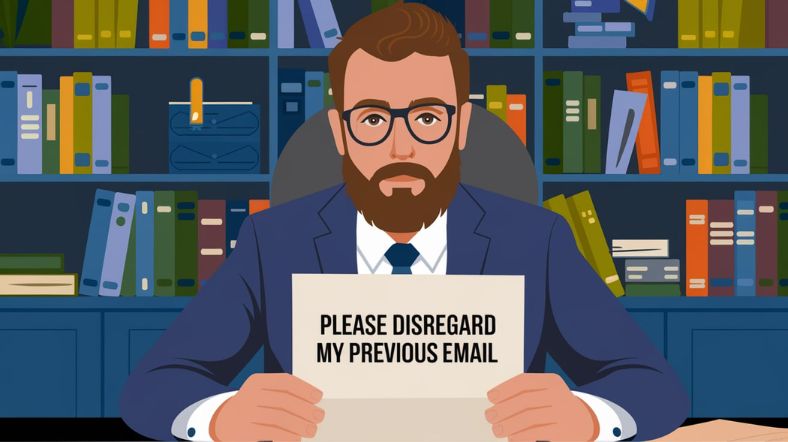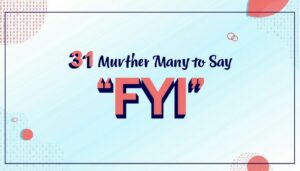In the fast-paced world of email communication, it’s not uncommon to send a message that requires revision or retraction.
Whether due to a mistake, an update, or simply a change in direction, retracting an email with clarity and professionalism is essential.
In this article, we will explore 19 alternative ways to politely and effectively say, “Please disregard my previous email.” These alternatives will help you maintain professionalism while fostering a positive, collaborative environment.
Kindly Ignore My Last Email
This polite request is a direct yet gentle way to ask the recipient to disregard the previous message. It conveys respect for the other person’s time and ensures they are not misled by outdated information.
Example: “Dear Team, kindly ignore my last email regarding the meeting time. The details have changed.”
Impact: This phrase sets a respectful tone while clearly addressing the need for the recipient to disregard the earlier message.
Please Ignore Previous Mail
This phrase is direct and clear, offering a no-nonsense way to ask the recipient to disregard your earlier message. It’s short, effective, and works well in a fast-paced work environment or when clarity is essential.
Example: “Please ignore previous mail about the meeting date, as the schedule has been updated.”
Impact: The simplicity of this phrase conveys confidence and urgency while maintaining professionalism. It’s best used when the previous email’s contents are no longer relevant, and you want the recipient to focus on the new message.
Kindly Disregard My Previous Email
The use of “kindly” softens the request, making it more courteous while maintaining professionalism. It’s often used in formal business communications or when addressing senior colleagues.
Example: “Kindly disregard my previous email about the upcoming deadlines, as the timeline has been revised.”
Impact: A respectful and diplomatic approach, which works particularly well when addressing executives or clients.
Kindly Ignore the Previous Mail
A slightly more polite version, “kindly ignore the previous mail” adds a gentle tone. It’s appropriate in more formal settings, where you want to remain courteous but clear.
Example: “Kindly ignore the previous mail regarding the office layout. The design has been finalized.”
Impact: This expression communicates a respectful and professional attitude, making it ideal for formal business communications. It conveys that you value the recipient’s time and don’t want them to waste it on outdated information.
Please Ignore This Mail
This variation keeps things short and to the point while signaling that the email you are asking them to disregard is the current one. It’s a simple, efficient way to redirect attention to a more relevant message.
Example: “Please ignore this mail about the conference venue. The location has changed, and I’ll send the updated details shortly.”
Impact: It works well for informal or time-sensitive matters where you need to correct or update information swiftly.
Please Ignore My Previous Email
This version is polite and professional, especially in business settings. It acknowledges that the recipient may have already read the earlier email but asks them to disregard it for clarity’s sake.
Example: “Please ignore my previous email about the report. I’ve realized it was sent in error, and I’ll provide the correct version soon.”
Impact: A friendly yet professional way to retract an email without sounding abrupt. It maintains respect and promotes clear communication.
Please Ignore the Previous Mail
A variation that is slightly more formal, this version is ideal when you’re in a professional setting and need to ensure that your request is understood without being overly casual.
Example: “Please ignore the previous mail regarding the project details. I’ll send an updated version after further review.”
Impact: This polite phrasing makes the message sound neutral and considerate, suitable for professional emails in more structured environments.
Please Overlook My Previous Message
A more formal version, this phrase is useful in professional settings where precision is key. It politely directs attention away from an earlier email without sounding abrupt.
Example: “Please overlook my previous message on the proposal submission deadline. The date has been extended.”
Impact: The phrase conveys maturity and professionalism, signaling that you’re taking responsibility for the confusion.
Disregard My Earlier Correspondence
This straightforward alternative is clear and to the point. It’s perfect for situations where the previous email no longer holds relevance or accuracy.
Example: “Disregard my earlier correspondence about the budget. I’ll send the corrected figures shortly.”
Impact: This phrase is efficient and authoritative, signaling to the recipient that the original information is no longer valid.
Set Aside My Last Email
This phrase is a bit more informal but still maintains a professional tone. It encourages the recipient to “put aside” the previous message in favor of more up-to-date information.
Example: “Please set aside my last email regarding the task list. I’ll be sending an updated version.”
Impact: By using “set aside,” you make the retraction feel like a simple organizational request, which helps minimize any potential inconvenience.
Forget About My Previous Email
A lighter, more casual phrase, this one works well when the retraction is relatively minor or in less formal communications. It signals that the earlier message should no longer be considered.
Example: “Forget about my previous email about lunch plans. I’ve made a new reservation.”
Impact: While friendly and easygoing, this phrase still communicates the need for correction or updates.
Please Dismiss My Earlier Note
“Dismiss” gives a professional edge while remaining courteous. This phrase can be used to quickly correct a message without over-explaining.
Example: “Please dismiss my earlier note about the project timeline. I will send an updated version with the correct dates.”
Impact: It ensures that the recipient understands the importance of ignoring the initial message while keeping the tone professional.
Ignore My Prior Communication
This direct approach works well when you need to clarify that the previous message contained mistakes or outdated information. It’s clear and leaves little room for misunderstanding.
Example: “Ignore my prior communication regarding the meeting agenda. The details have changed.”
Impact: Simple, efficient, and professional, this phrase helps avoid confusion and brings attention to the latest updates.
My Apologies for the Confusion
Instead of outright asking someone to disregard the email, this phrase acknowledges any potential confusion caused by the prior communication and offers a gentle retraction.
Example: “My apologies for the confusion in my last email. The event details have been revised.”
Impact: By offering an apology, you display humility and accountability, which strengthens your professional rapport with the recipient.
Please Brush Off My Earlier Email
This one is a bit more casual and can be used in less formal emails. It’s friendly but still respectful, indicating that the previous message can be easily ignored.
Example: “Please brush off my earlier email about the team outing—there have been some updates.”
Impact: This phrase makes the correction feel less formal and more like a quick, simple fix, which can make the recipient feel at ease.
Please Ignore My Prior Message
This simple and effective phrase directs the recipient’s attention away from the earlier email, signaling that the prior message should no longer be taken into account.
Example: “Please ignore my prior message regarding the conference call schedule. I’ll be sending an updated one soon.”
Impact: Direct and to the point, this phrase communicates urgency without sounding too abrupt.
Let’s Forget About My Last Email
This phrase introduces a collaborative tone, suggesting that both you and the recipient can move forward from the earlier communication. It’s ideal for situations where you want to downplay the mistake.
Example: “Let’s forget about my last email regarding the report format. I’ll send the new guidelines shortly.”
Impact: By using “let’s,” you soften the correction and make the recipient feel part of the process, which encourages a positive and productive exchange.
I’d Like to Retract My Previous Email
When you need to be especially clear about withdrawing a message, this phrase is perfect. It’s direct and formal, making it ideal for serious situations where accuracy matters.
Example: “I’d like to retract my previous email about the budget proposal. I’ll send an amended version shortly.”
Impact: This phrase is authoritative and professional, showing that you are fully responsible for the error and are taking immediate action.
Please Discard My Earlier Message
This phrase is a clean and direct way of asking the recipient to disregard an earlier communication. It’s professional and easy to understand, making it ideal for both formal and informal contexts.
Example: “Please discard my earlier message about the meeting agenda. I’ve sent the corrected version to all participants.”
Impact: By using “discard,” you remove any emotional weight from the situation and simply ask the recipient to focus on the new message.
Conclusion
When you need to correct or retract a message, “Please disregard my previous email” is an effective, respectful way to handle the situation. Using this phrase ensures clarity and professionalism in your communication.
Choosing the right alternative to “Please disregard my previous email” can further enhance your message. It allows you to maintain a positive tone while keeping your communication clear and efficient.

Mark Tony is a grammar expert with 5 years of experience, specializing in teaching English grammar, enhancing writing, reading, and speaking skills for diverse learners.









